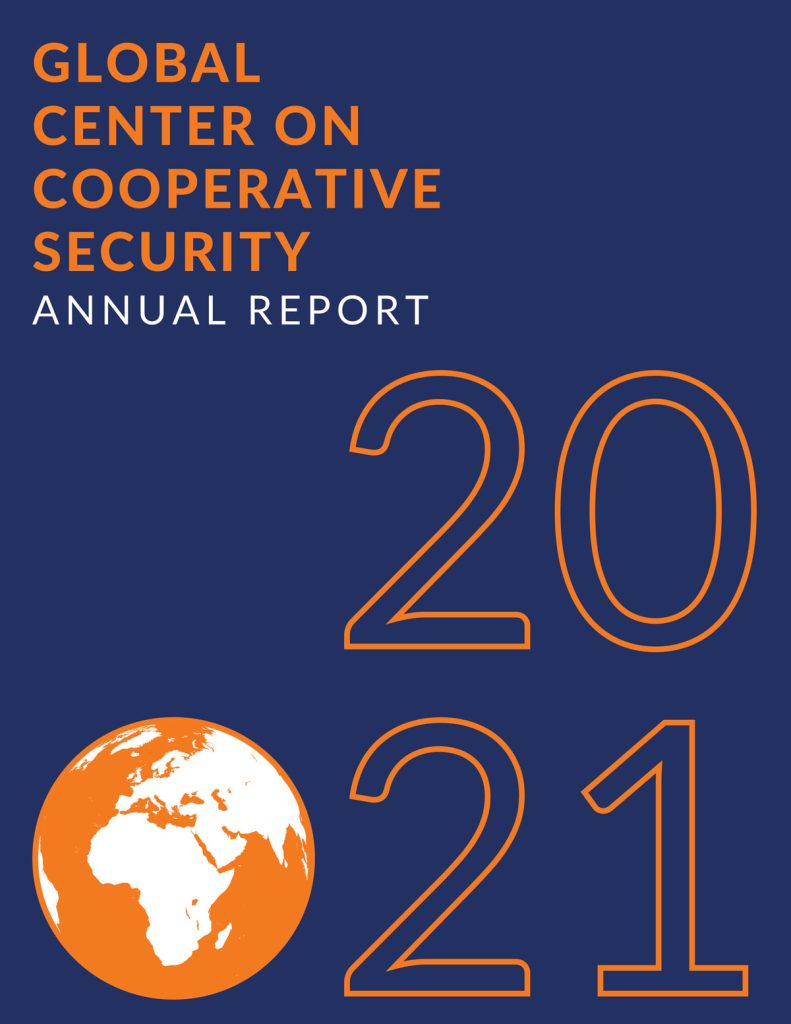The Global Center hosted a series of interactive, informal roundtable discussions on substantive issues and new developments relating to violent extremism, terrorism, and counterterrorism with guest speakers representing the United Nations, national governments, civil society, and the private sector. These roundtables are part of the Global Center’s work on promoting and protecting human rights, safeguarding civic space, and advancing rule-of-law based approaches to countering terrorism and preventing violent extremism in line with the UN Global Counter-Terrorism Strategy.
Topics included national action plans, use of financial investigations in countering the financing of terrorism (CFT) and its implications for human rights, and the development of screening, prosecution, rehabilitation, and reintegration frameworks.
21 May 2021: A Conversation with Civil Society on The Seventh Review of the United Nations Global Counter-Terrorism Strategy
The Global Center, in collaboration with the Special Rapporteur on the promotion and protection of human rights and fundamental freedoms while countering terrorism, Ms. Fionnuala Ní Aoláin, brought together UN member state and civil society representatives to discuss priority issues in the Seventh Review of the Global Counter-Terrorism Strategy. These include oversight and accountability of UN and member state efforts to implement the Strategy, the UN’s engagement with civil society throughout the Strategy review process, and the applicability of new terminology to describe evolving terrorism threats, including those identified in the Secretary General’s report on Activities of the UN system in implementing the UN Global Counter-Terrorism Strategy. Opening remarks were delivered by Ms. Ní Aoláin and Ms. Melissa Lefas, Global Center’s Chief of Strategy. Closing remarks were delivered by H.E. Mr. Agustín Santos Maraver, Permanent Representative of Spain to the UN.
29 April 2021: Situating UN Counterterrorism and PVE efforts within the Organization’s Reforms and the Prevention Agenda
The Global Center’s ninth roundtable explored the extent to which UN counterterrorism and preventing violent extremism efforts are Participants discussed how these efforts can best support prevention and sustainable peace, while examining the potential risks of a more expansive counterterrorism agenda at the country level. Further discussion points included the benefits of locally driven and long-term, sustained civil society engagement and the importance of the UN counterterrorism architecture promoting and protecting human rights in all its efforts.
Featured speakers: Ms. Valerie Julliand (UN Resident Coordinator, Indonesia), Ms. Hanaa Singer (UN Resident Coordinator, Sri Lanka), Mr. Kurtmolla Abdulganiyev (UN Peace and Development Advisor, Kyrgyzstan), Ms. Nika Saeedi (UNDP), Mr. Fadi Abi Allam (Permanent Peace Movement Lebanon), Mr. Keneshbek Sainazarov (Search for Common Ground Central Asia)
2 December 2020: Launch of the 2020 Global Terrorism Index
For its eight roundtable event, the Global Center co-hosted the launch of the 2020 Global Terrorism Index in collaboration with the Institute for Economics and Peace, the United States Institute of Peace (USIP), and the RESOLVE Network in collaboration with the Global Research Network of the United Nations Counter-Terrorism Committee Executive Directorate (CTED). Among its key findings, the index notes a decline in deaths from terrorism for the fifth consecutive year, a 250% increase in right-wing terrorism in the last five years, a geographic shift for ISIL’s “center of gravity,” and the decrease of deaths caused by ISIL to below 1,000 for the first time since the group’s inception. Discussions also addressed the impact of the COVID-19 pandemic and the link between conflict and terrorism, among others. The event can be viewed here.
Featured speakers: Mr. Steve Killelea (Institute for Economics and Peace), Assistant Secretary-General Michele Coninsx (CTED), Mr. Alastair Reed (United States Institute of Peace and RESOLVE Network)
20 August 2020: Engaging Civil Society in Rehabilitation and Reintegration Efforts in Prisons
The Global Center and the government of the Republic of Indonesia, president of the Security Council in August 2020, hosted the seventh event in its monthly roundtable series to discuss civil society engagement in prison-based rehabilitation and reintegration efforts. During the discussion, participants addressed the role of civil society and government cooperation in prisons, including requirements for meaningful engagement of civil society in rehabilitation and reintegration efforts. Relevant prerequisites mentioned include structural and legal frameworks for engagement, sustained multi-year funded programs, and systematic and trust-building cooperation between governments, public sector, and civil society. Participants recognized the reputational and security risks for both governments and civil society organizations when working together, as well as the important gains that such cooperation can have on positive reintegration outcomes.
Featured speakers: Ms. Siti Darojatul Aliah (Society Against Radicalism and Violent Extremism), Mr. Christopher Dean (Identify Psychological Services, Ltd.), Dr. Siobhan O’Neil (United Nations University), Mr. Maximilian Ruf (Violence Prevention Network)
20 May 2020: Terrorism, Mass Surveillance, and Emerging Technologies
This virtual event addressed the use of surveillance mechanisms and the collection of personal data in counterterrorism investigations. The discussion drew attention to the broad abuses in mass surveillance technology and the challenges of ensuring human rights-compliant practices, emphasizing the roles that the United Nations, the private sector, and civil society can play. Panelists commented on the need for visible leadership in this area and further efforts to understand the broader implications of mass data collection practices for counterterrorism purposes outside of the national security space.
Featured speakers: Dr. Ilia Siatitsa (Privacy International), Mr. Alexander Moorehead (OHCHR), Mr. Javed Ali (former U.S. National Security Council), and Dr. Eleonore Pauwels (Global Center)
2 April 2020: Developing and Implementing Screening, Prosecution, Rehabilitation and Reintegration Strategies
The Global Center hosted its first virtual roundtable event in the series to discuss approaches for developing and implementing screening, prosecution, rehabilitation, and reintegration strategies. The discussions highlighted the need to develop context-specific approaches that account for the legal, political, sociological, and material constraints. Discussants emphasized select human rights challenges, including the need to uphold individual criminal responsibility and the presumption of innocence, the collection and use of data for screening processes, and the need to promote and protect children’s and victims’ rights and protect against gender-based violence.
Featured speakers: Prof. Issa Saibou (University of Maroua), Mr. Steven Siqueira (UNOCT), and Mr. Ulrich Garms (UNODC)
15 January 2020: The Use of Financial Investigations in CFT and its Implications for Human Rights
This event focused on the collection and use of financial data in terrorism investigations and the effects of CFT regulations on the shrinking space for civil society and human rights. Featured speakers highlighted the instrumental role financial investigations can play in disrupting the flow of illicit funds and identifying suspects, while emphasizing the applicable legal frameworks in the collection, use, and sharing of financial information. Participants challenged the perceptions that the non-profit sector is inherently at higher risk for terrorism financing and the effect these regulations have on civic space.
Featured speakers: Mr. Shaun McLeary (Global Center), Ms. Jacqueline Shire (1267 Monitoring Team), Ms. Delphine Schantz (UN CTED), and Ms. Deborah Brown (Association for Progressive Communications)
13 December 2019: Launch of the Global Terrorism Index
The Global Center and the Institute for Economics and Peace co-hosted the New York launch of the Global Terrorism Index 2019. Key trends in the report were highlighted, which include a 320% rise of violent right wing extremism reported over the last five years, the increased activity and deadliness of the Taliban attacks, and the shifting presence of the Islamic State in West Africa and the Lake Chad Basin Region. The discussion centered on the implications of the trends and data contained in the Index, including the ways in which technology has changed the anatomy of violent extremism, the use of widespread information manipulation, and the growing role of the private sector in these efforts, as well as the impact of counterterrorism strategies on women’s rights.
Featured speakers: Mr. Serge Stroobants (Institute for Economics and Peace), Ms. Letta Tayler (Human Rights Watch), and Ms. Audrey Alexander (U.S. Military Academy West Point)
18 November 2019: National and Regional Plans of Action to Prevent Violent Extremism
This event launched the roundtable series and highlighted current efforts undertaken by UN member states to prepare national and regional action plans to prevent violent extremism, which now require sustained and rigorous monitoring and evaluation. The discussions raised the important role that Resident Coordinators play in orienting the UN’s efforts to support governments in implementing these plans; the need for improved engagement at the local level, including through the creation of community-based action plans; and the importance of inviting civil society to participate in the creation of such plans from the outset.
Featured speakers: Mr. Raja Gundu (UNOCT) and Mr. Alexander Avanessov (UNDP)

